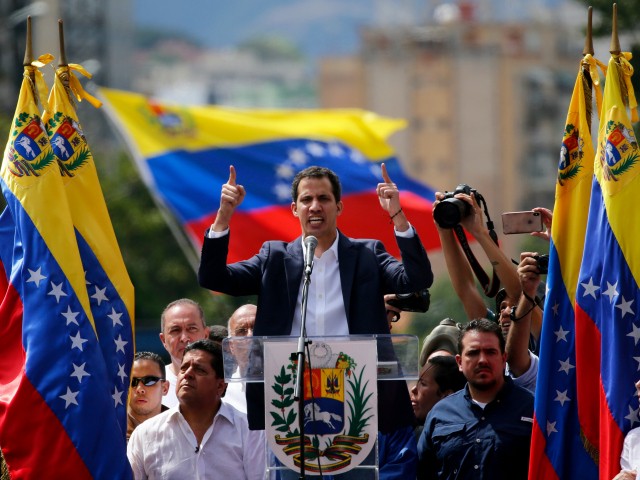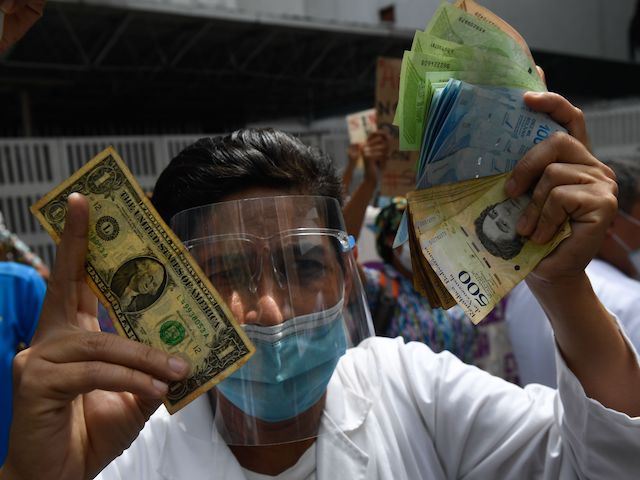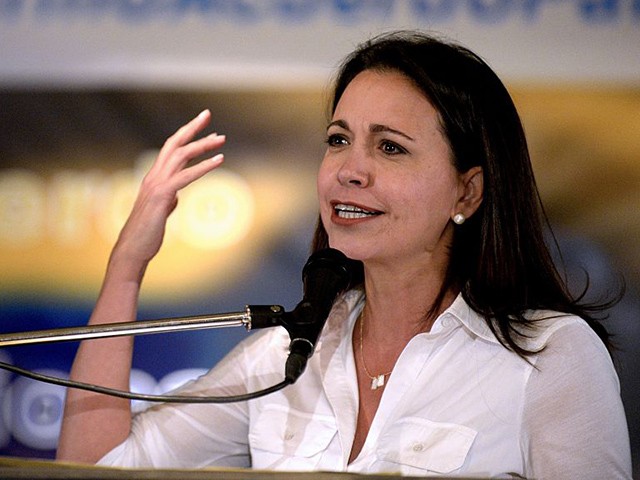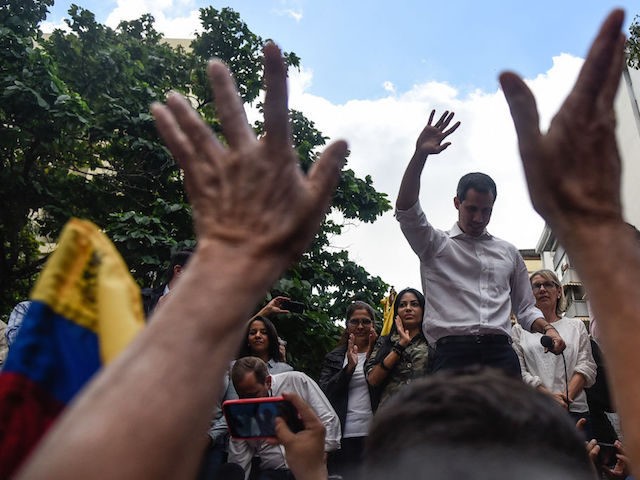CARACAS — Juan Guaidó’s interim presidency of Venezuela will soon reach its third year in a most weathered and worn-out state.
It has been three years of corruption scandals, unprecedented international and diplomatic support, controversies, and ultimately, not much improvement in the daily lives of Venezuelans.
A glaring lack of progress with regards to ousting the authoritarian socialist regime and the looming threat of coexistence between it and the opposition is the end result so far and, as such, much of the population has given up supporting what was, at the time, a longshot but possible breakthrough for freedom in the country.
More than anything, the recent departure of Guaidó’s top diplomat, Julio Borges, served to remind the general populace that Guaidó’s government existed at all. Most had already forgotten about him. While he is, in fact, the rightful president of Venezuela following the circumstances surrounding the illegitimate elections of 2018, he hasn’t been able to exercise any sort of tangible power in the country whatsoever.
Guaidó made three concrete promises to the Venezuelan people in 2019: the end of dictator Nicolás Maduro’s “usurpation” of power, the formation of a transitional government, and free elections. We’re at the eve of 2022 and none of it is even remotely close to happening — on the contrary, the opposition is now very much content with participating in sham elections that elevate Maduro so long as they get a slice of the metaphorical electoral cake.

Juan Guaidó, head of Venezuela’s opposition-run congress, sworn in as president of the nation until elections can be held during a rally demanding President Nicolás Maduro’s resignation in Caracas, Venezuela, Wednesday, Jan. 23, 2019. (AP Photo/Fernando Llano)
In his resignation press tour, Borges stated that Maduro had tailored an opposition that suits him and blamed both sides for this. For the past two decades, the socialist regime has been content with tolerating the Venezuelan opposition, as they’ve always loved to find ways to coexist with each other and keeping the political status quo. Many of the opposition’s prominent figureheads are members of the Socialist International, so they have no true ideological disagreements with Maduro.
Rather than fight them, Maduro skillfully stalled on any changes, waiting for the opposition to deflate. It pains me to give Maduro any sort of credit, but Napoleon Bonaparte’s old saying, “never interrupt your enemy when he is making a mistake,” is exactly all that Maduro had to do during these past years.
Maduro has let the interim presidency collapse on its own and coated Venezuela with a false paint of normality through the easing of some of the draconian regulations that brought the country to ruin — even if such flexibilization goes against the two decades of the ideology espoused upon the country. Among the examples of this is the easing (but not complete removal) of currency control laws that destroyed the country’s currency. Casinos, the “capitalist vice” once banned by the late Hugo Chávez, now have the blessing of the socialist regime, and blatant money laundering runs rampant in the country.

A health worker wearing a face mask and shield holds a one dollar bill in one hand and its equivalent in Bolivar bills -his salary- in the other, during a protest for the lack of medicines, medical supplies and poor conditions in hospitals, in Caracas on October 29, 2020, amid the new coronavirus pandemic. (Federico Parra/AFP via Getty Images)
The United Socialist Party of Venezuela (PSUV), Maduro’s party, has not forsaken its haggard ideology, examples of which can be found in its ongoing desire to implement a “Communal State.” But in this moment, they need some small doses of capitalism not just to save face with the international community, but to ensure the ongoing survival of the regime and its narco-terrorism machinery.
Partly due to these changes, and partly due to the opposition offering little to root for, there is little to none of that once effervescent support placed on Guaidó and the Venezuelan opposition in early 2019 these days, and long gone are the intense days of protest lived during the first days of his presidency. Nowadays, the name “Juan Guaidó” is something rarely spoken about as Venezuela, and all of its latent problems, continue with or without him.
Amidst the palpable fade into irrelevance, Guaidó continues the now tired and exhausted discourse of reunifying opposition forces and calling for free elections in 2024 with no guarantees of such a thing happening.
The nature of Juan Guaidó’s presidency was always intended to be a transitory one, hence the interim denomination. The opposition-led parliament had an original tenure that expired in January 2021, extended for a year following the aftermath of the sham legislative elections in 2020. As no free elections have taken place yet in Venezuela, the continuity of the opposition-led National Assembly and by extension, Guaidó’s presidency, was extended for an additional year on December 27, 2021.
Support among the opposition has been mixed. While the majority of the opposition parties support the move, María Corina Machado, a conservative opposition party leader, has withdrawn her support to Guaidó’s presidency. José Ignacio Hernández, Guaidó’s former Special Prosecutor of the Interim Government, has stated that such a move violates the constitution.

Venezuelan opposition leader Maria Corina Machado speaks during a rally in Caracas on February 24, 2015. (FEDERICO PARRA/AFP via Getty Images)
On a practical level, the continuity of Guaidó’s presidency for an extra year changes nothing for the lives of Venezuelan citizens. Despite the aura of normality that you may perceive at a first glance, Venezuela’s healthcare and education infrastructure lie in shambles. Regardless of whether you support Maduro, Guaidó, or neither, 76.6 percent of Venezuelans now live in extreme poverty and, when measured at an income level, 94.5 percent of the country’s remaining 28,4 million inhabitants live in poverty.
Beyond extending Guaidó’s presidency and the National Assembly that was legitimately elected in 2015, the opposition has no effective strategy to play at the moment. Undoubtedly, some manner of reform or a new approach would have to take place, as nothing has come out of the past three years of this interim presidency.
Our constitution stipulates that any elected official can be subject to a recall referendum after half of his or her elected term has elapsed — but to do this to Maduro would mean having to recognize his presidency as a legitimate one. The opposition’s National Assembly attempted this path in 2016, but its efforts were thwarted by the socialist regime’s electoral authorities.
At the reality of Guaidó’s irrelevant presidency, Maduro’s illegitimate one, the lack of any tangible solution, and with no politicians to place their faith on, most Venezuelans have but two choices: keep going with their lives, tacitly accepting Maduro’s false normalcy but knowing full well that things won’t really get better other than the fact that you can get some imported U.S. snacks with ease (provided you can afford them) – or flee and never look back, vowing to never repeat the mistakes that inflicted all of these calamities upon Venezuela in the first place.
Christian K. Caruzo is a Venezuelan writer and documents life under socialism. You can follow him on Twitter here.

COMMENTS
Please let us know if you're having issues with commenting.